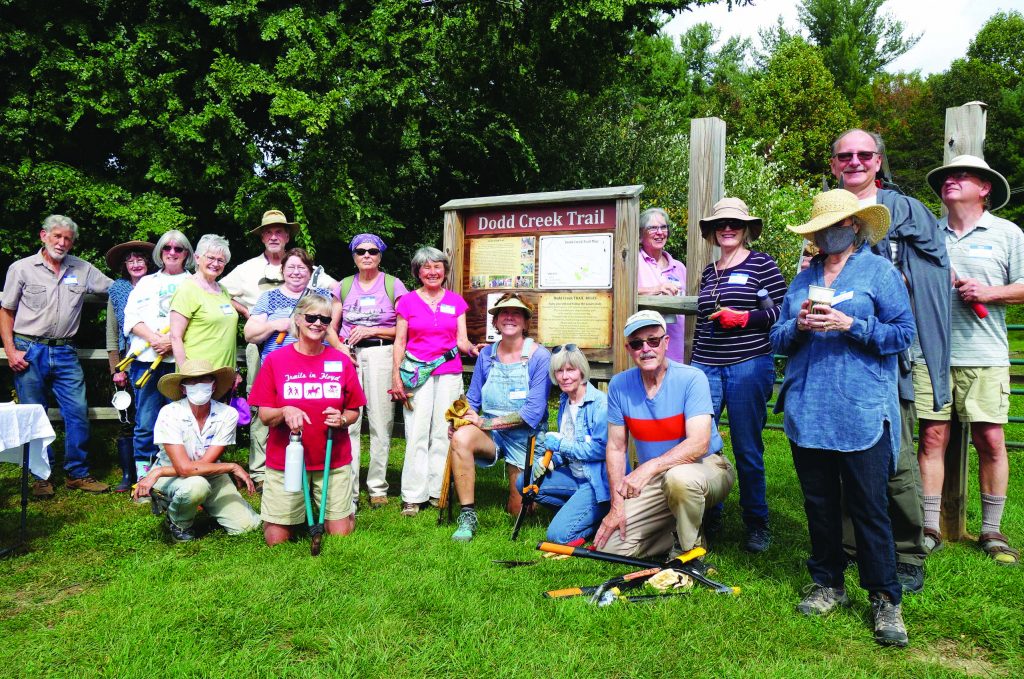
Partnership for Floyd Dodd Creek trail volunteers
The Park Committee Volunteers who worked hard from 2008 to 2014 to design, organize and build the beautiful place we have today. Left to right, back row: Mike Maslaney, Mac Traynham, Woody Crenshaw, Ralph Roe, Randall Wells. Front row: Jack Wall, Jane Cundiff, Betty Lineberry, Anne Pendrak, Karin Grosshans, Dede McGrath, Marjorie Wells, Ellie Roe.
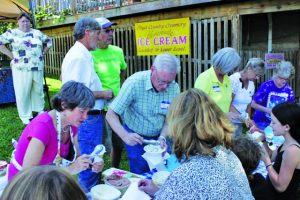 In the spring of 2024, the Partnership for Floyd (PFF) will be celebrating 20 years of civic work in Floyd, and preparations are underway! The first step in these preparations will be to increase recognition of the organization. Most recognized for its development of Warren G. Lineberry Park, as well as the Park-to-Library and Dodd Creek Trails, the non-profit citizen group has also hosted Earth Day and Health Fair events, held fundraisers for its projects, and was influential in the revitalization of downtown Floyd through providing support for government grants and volunteer labor.
In the spring of 2024, the Partnership for Floyd (PFF) will be celebrating 20 years of civic work in Floyd, and preparations are underway! The first step in these preparations will be to increase recognition of the organization. Most recognized for its development of Warren G. Lineberry Park, as well as the Park-to-Library and Dodd Creek Trails, the non-profit citizen group has also hosted Earth Day and Health Fair events, held fundraisers for its projects, and was influential in the revitalization of downtown Floyd through providing support for government grants and volunteer labor.
The Partnership was founded in January of 2004 as a spin-off from the Old Jacksonville Cemetery committee. That committee was formed after the Hotel Floyd property purchase by Jack Wall and Kamala Bauers to assure that the cemetery grounds adjacent to the hotel would be protected during hotel construction. It brought together citizens and business owners, as well as town and county officials, with a vision to preserve and enhance what makes Floyd special. Their goals were also to promote tourism, community development, and town improvements.
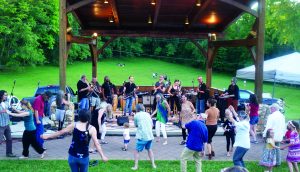 The late Sam Moore, who was the founding PFF Vice President, as well as a former employee of the Virginia Department of Transportation (VDOT), first brought up the idea of applying for a TEA-21 transportation enhancement grant through VDOT. This grant was approved and used to build sidewalks, including a pathway from the hotel to downtown Locust Street. These new walkways served to link up hotel patrons with downtown activities and businesses, including Floyd’s famous Friday Night Jamboree at The Floyd Country Store.
The late Sam Moore, who was the founding PFF Vice President, as well as a former employee of the Virginia Department of Transportation (VDOT), first brought up the idea of applying for a TEA-21 transportation enhancement grant through VDOT. This grant was approved and used to build sidewalks, including a pathway from the hotel to downtown Locust Street. These new walkways served to link up hotel patrons with downtown activities and businesses, including Floyd’s famous Friday Night Jamboree at The Floyd Country Store.
“We were novices and really busy in the beginning,” said Bauers, a founding member of the PFF who initially served as the Partnership’s Project Manager. As Project Manager, Bauers began looking at other communities that were successful in getting redevelopment grants, and she talked to their town managers. She learned that governments need non-profit community partners to qualify for grants. The group applied for and were accepted as a Virginia Main Street Affiliate through Richmond’s Department of Housing and Community Development, after which the members began attending Main Street training events and workshops.
At the time the Partnership was forming, Lydeana Hylton Martin was working for the New River Valley Regional Commission; a commission that identifies needs and seeks funding to meet those needs. As a Floyd native, Lydeana attended an early PFF meeting and offered her expertise, walking members through the grant process. Later that year, she was hired for the newly created Floyd position of Director of Economic Community Development, which she holds to this day.
In an October 2004 Roanoke Times story about Martin’s Floyd position, she commended the volunteer planning work that makes grants possible. “It’s amazing to me, the private citizens that are volunteering their time. To me, they are the heroes that let the grant writer tell that story.”
The twenty-percent local matching funds for the TEA-21 grant didn’t deter the PFF from its goal. House meetings and antique auction fundraisers were held. Wall and Bauers also donated a portion of the Hotel Floyd property to help meet the local matching funds for the grant.
Securing the Main Street Affiliate designation and the TEA grant was followed by efforts to secure downtown Floyd as a designated historic district. Historic preservation officials from Roanoke and Richmond presented an informative historic buildings rehabilitation tax credit workshop. After this, a committee was created to catalogue every historic structure in town, of which there were over two hundred! Taking part in this effort were D.C. architects Cy Markeses and Belynda Reeder, who were working on the green design for the Hotel Floyd. There were also Virginia Tech architect students, as well as The Old Church Gallery local historian, Kathleen Ingoldsby.
“The important thing is that the history of the people who helped build the town and the buildings they created are fully described in the document, and that record has gone on to create the Historical Society’s popular Walking Tour and is available for other historical documents and grants,” Ingoldsby said.
The national and state historic designation made it possible for the town to qualify for, and be approved for, a Virginia Community Development Block Grant (CDBG). The Partnership worked closely with the Town Council and Clerk to explore options for how to use the CDBG grant funds. To encourage input from the community, the Woman’s Club hosted an information panel of eleven local businesses and agencies that was moderated by Martin. Martin also reviewed citizen survey results at a Chamber of Commerce meeting. Mass mailings, a public hearing, and fundraisers were held and a Block Grant management team was formed.
The CDBG grant funds provided business façade improvements, gateway signs, downtown sitting areas, and the parking lot along Locust Street, which has become a key component to the downtown revitalization, benefitting businesses and residents. Also drawing visitors to what Floyd has to offer are the beautiful landscapes, farms, artisans, musicians, mountain traditions, and Floyd’s do-it-yourself entrepreneurial spirit.
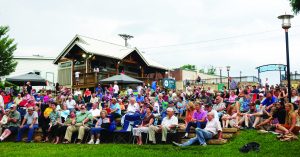
The town comes out to hear Wayne Henderson and Helen White play a Small Town Summer event.
In a 2019 guest column for Blue Ridge Country Magazine, Floyd’s current Mayor, Will Griffin, wrote an article about how the changes in Floyd have benefited the community. He wrote about Floyd’s accessibility to The Blue Ridge Parkway, the resurgence of old time and bluegrass music, the Floyd Country Store as a noted venue on Virginia’s Crooked Road Heritage Music Trail, and the growing success of Floydfest, which has solidified Floyd’s position as a music destination.
“We have created a vibrant tourist economy without giving up who we are,” wrote Griffin, who attended the first PFF meeting before he was the town mayor.
Every town needs a park, and to date, the Warren G. Lineberry Park has been the Partnership’s biggest undertaking. After the town of Floyd purchased the 2.7 acres of park land from the Lineberry family in 2006, the PFF reintroduced antique auctions and appraisals, and they hosted an ice cream social to raise money to build the amphitheater stage that graces the property today. The town provided additional funds and the children’s playground, as well as the seating areas. The PFF gathered community input, organized projects, and brought volunteers and professionals together to get the job done.
During the whole project, the community stepped up. Phoenix Hardwoods donated handcrafted wooden benches. Swede McBroom donated a hand-crafted picnic table. Floyd County High School students worked with local musicians, Mack and Jenny Traynham, on the gazebo music shelter that was designed, coordinated, and donated by the Traynhams. The entrance sign for the park and the specially designed lights were built and donated by Woody and Jackie Crenshaw and the folks at Crenshaw Lighting.
To date, Lineberry Park has been the site of picnics, live music events, a Floyd CARE Juneteenth Celebration, The Floyd Small Town Summer concert/movie series, a Christmas Tree Lighting event, and more.
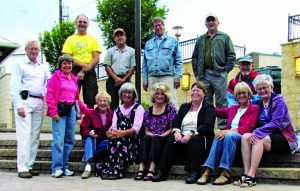 Martin recently recalled the work that the PFF has done over the years for “the good of many,” including when the group funded an educational and publicly-viewed water video that one of her interns created to raise awareness about the complexity and vulnerability of Floyd ground water.
Martin recently recalled the work that the PFF has done over the years for “the good of many,” including when the group funded an educational and publicly-viewed water video that one of her interns created to raise awareness about the complexity and vulnerability of Floyd ground water.
Griffin, who noted that tourism dollars reduce the tax burden on local tax payers, credited the Block Grant as “the most important thing to happen to Floyd since I’ve been involved in town government, which has been over thirteen years.”
On a recent Saturday, while sitting on the Dogtown Roadhouse deck which overlooks the Lineberry Park, Bauers enjoyed lunch as she watched families enjoying the park. “People came together and did this,” she said. “It really has been a partnership.”
The Partnership, awarded Floyd’s Nonprofit of the Year by the Chamber of Commerce in 2021, meets the fourth Monday of each month and is continuing their work developing educational walking trails and planning for a Spring Health Fair. Flower Power, a new offshoot of the PFF, has been busy beautifying the town with flower plantings and painted murals. All are welcome.
The Partnership for Floyd
www.PartnershipForFloyd.Wordpress.com
